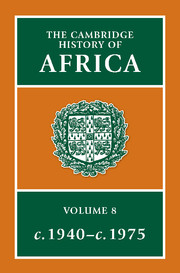Book contents
- Frontmatter
- Introduction
- 1 The Second World War: prelude to decolonisation in Africa
- 2 Decolonisation and the problems of independence
- 3 Pan-Africanism Since 1940
- 4 Social and cultural change
- 5 The economic evolution of developing Africa
- 6 Southern Africa
- 7 English-speaking West Africa
- 8 East and Central Africa
- 9 The Horn of Africa
- 10 Egypt, Libya and the Sudan
- 11 The Maghrib
- 12 French-speaking tropical Africa
- 13 Madagascar
- 14 Zaire, Rwanda and Burundi
- 15 Portuguese-speaking Africa
- Bibliographical essays
- Bibliography
- Index
- References
13 - Madagascar
Published online by Cambridge University Press: 28 March 2008
- Frontmatter
- Introduction
- 1 The Second World War: prelude to decolonisation in Africa
- 2 Decolonisation and the problems of independence
- 3 Pan-Africanism Since 1940
- 4 Social and cultural change
- 5 The economic evolution of developing Africa
- 6 Southern Africa
- 7 English-speaking West Africa
- 8 East and Central Africa
- 9 The Horn of Africa
- 10 Egypt, Libya and the Sudan
- 11 The Maghrib
- 12 French-speaking tropical Africa
- 13 Madagascar
- 14 Zaire, Rwanda and Burundi
- 15 Portuguese-speaking Africa
- Bibliographical essays
- Bibliography
- Index
- References
Summary
POLITICAL AND CONSTITUTIONAL HISTORY: PRE-INDEPENDENCE
On the eve of the Second World War, the vast majority of Malagasy were French sujets who had extracted few political concessions from Paris. But political awareness was developing, especially among the urbanised Merina, whose leaders, Jean Ralaimongo and Joseph Ravoahangy, had agitated in favour of equal civil and political status with the Europeans and the reform of local labour regulations. Their campaign achieved Malagasy representation on a consultative body created in 1924, called the Délégations Économiques et Financières. The administration dominated the Délégations, quarrelled with the settlers' representatives, and ignored the Malagasy delegates. As a result the Malagasy gained limited knowledge of parliamentary procedure from them. Léon Cayla's term as governor-general (1930–9) witnessed the suppression of political activities and a decree establishing arbitrary arrest; anti-government newspapers were banned and labour was tightly controlled. Under pressure from the Popular Front government, he permitted the formation of the first trade unions in 1937. When he returned to France in 1959 he left a colony in which the mass of the population accepted French rule. But he also left behind an educated élite which harboured political and personal grievances against the administration.
The outbreak of the Second World War produced a wave of Malagasy patriotism, which the new Governor-General, Marcel de Coppet, used to mobilise Madagascar's resources. The collapse of France resulted in de Coppet's recall by the Vichy regime and the re-appointment of Cayla, who was forced to leave nine months later because he had reached retirement age. His successor was Armand Annet, who repressed all opposition, discriminated against the Malagasy, and abolished the Délégations.
- Type
- Chapter
- Information
- The Cambridge History of Africa , pp. 674 - 697Publisher: Cambridge University PressPrint publication year: 1984



